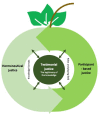Legitimizing user knowledge in mental health services: Epistemic (in)justice and barriers to knowledge integration
- PMID: 36090358
- PMCID: PMC9454952
- DOI: 10.3389/fpsyt.2022.981238
Legitimizing user knowledge in mental health services: Epistemic (in)justice and barriers to knowledge integration
Abstract
Including the voices and knowledge of service users is essential for developing recovery-oriented and evidence-based mental health services. Recent studies have however, suggested that challenges remain to the legitimization of user knowledge in practice. To further explore such challenges, a co-production study was conducted by a team of researchers and representatives from user organizations in Sweden. The aim of the study was to explore the barriers and facilitators to the legitimacy of user knowledge, as a central factor in sustainably implementing user influence in mental health practice. A series of workshops, with representatives of mental health services and user organizations were conducted by the research team to explore these issues. The analysis built on the theoretical framework of epistemic injustice, and the underlying aspects, testimonial, hermeneutic and participation-based injustice, were utilized as a framework for a deductive analysis. Results suggest that this is a useful model for exploring the complex dynamics related to the legitimacy of user knowledge in mental health systems. The analysis suggests that the legitimacy of user knowledge is related to the representativeness of the knowledge base, the systematic formulation of this knowledge in applicable methods, access to resources and positions within the mental health system and participation in the process of integrating this knowledge-base in mental health contexts. Legitimizing user knowledge in practice additionally challenges mental health systems to support readiness for change in working environments and to address the power and role issues that these changes involve.
Keywords: co-production in research; epistemic injustice; implementation; mental health services; recovery; user involvement; user organizations.
Copyright © 2022 Grim, Näslund, Allaskog, Andersson, Argentzell, Broström, Jenneteg, Jansson, Schön, Svedberg, Svensson, Wåhlstedt and Rosenberg.
Conflict of interest statement
The authors declare that the research was conducted in the absence of any commercial or financial relationships that could be construed as a potential conflict of interest.
Figures
References
-
- Börjeson M, Karlsson M. Brukarmakt-I Teori Och Praktik. Stockholm: Natur och kultur; (2011).
LinkOut - more resources
Full Text Sources


